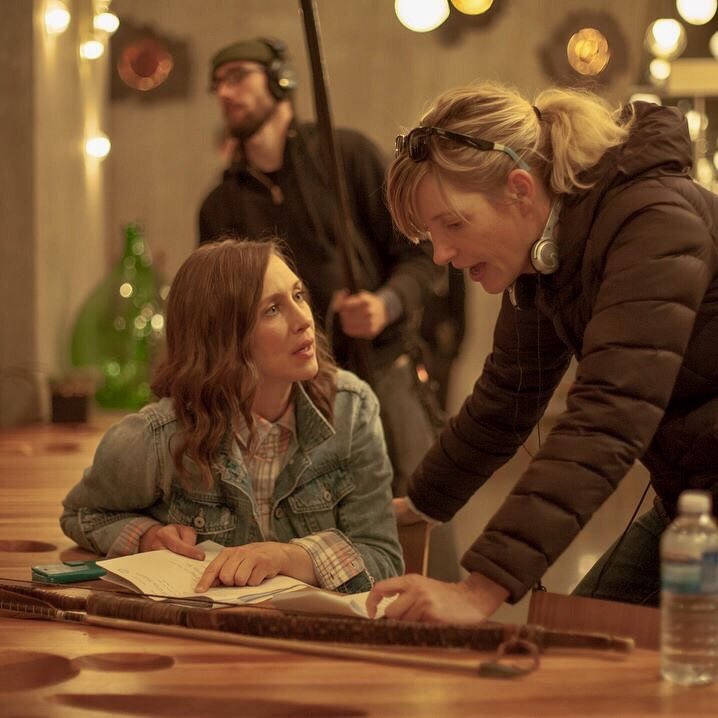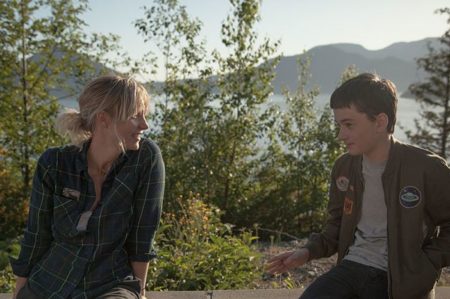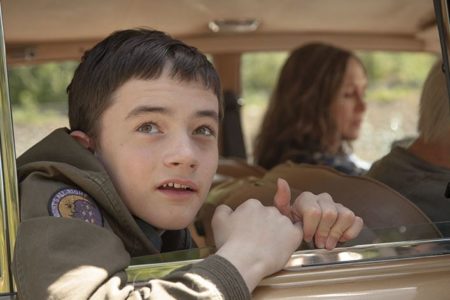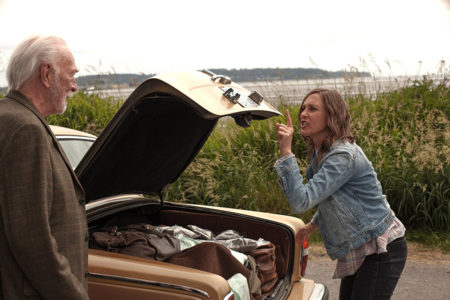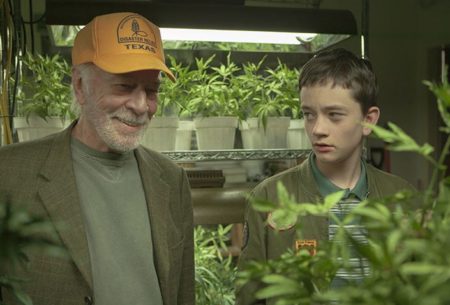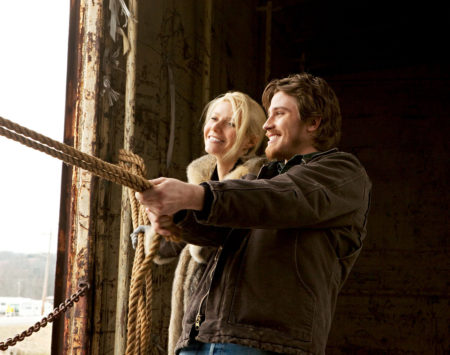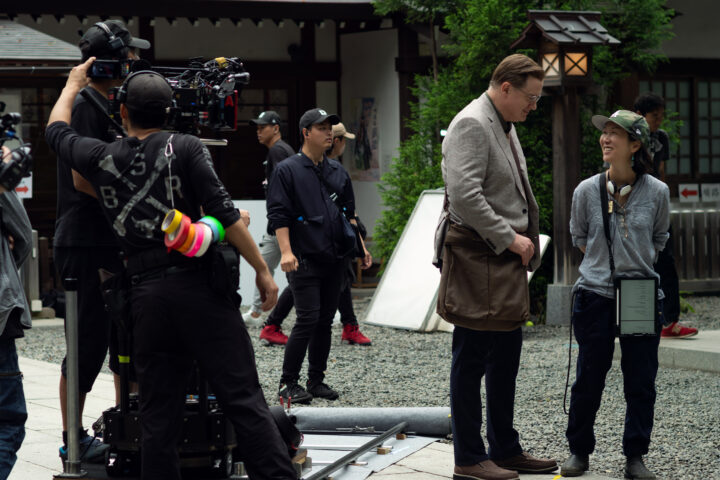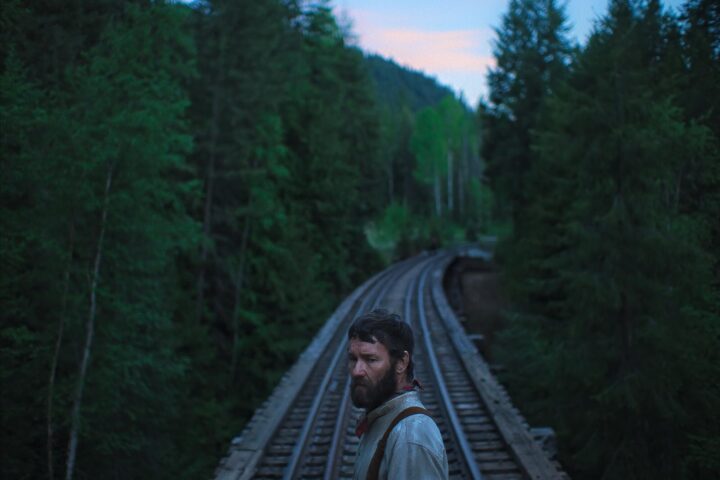Across four features, writer-director Shana Feste has displayed a compassion for her characters that defines her a distinctly humanist filmmaker, one who writes people she dearly cares for and then pushes them into difficult places. Whether parents grieving a son’s untimely death, a country and western superstar self-destructing backstage (and on it) or a teenage boy and girl fighting for an impossible love, Feste sees her characters, with great empathy, through some really tough times.
She also gets memorable performances. In hew new picture, Boundaries, starring Vera Farmiga and Christopher Plummer as an estranged father and daughter coming to terms over a long California road trip, Feste tackles the real-life thorny dynamics shared with her own father and a host of unresolved fictional family issues, including a non-traditional relationship with a socially awkward teenaged son, well-played by young star Lewis MacDougall (A Monster Calls).
An author of human experience both in the Hollywood machine and indie realms, Feste is an instinctual actor’s director who in Boundaries brings the drama close to her own life as an act of personal inquisition. After unfulfilling, bigger budget outings, the filmmaker reclaims her voice in her self-reflexive, observant little movie about learning to eradicate family baggage and find a way back home, and to each other.
The card-carrying-journalist rules dictate that it’s highly unprofessional to tell an interview subject that you are his or her biggest fan—heavens no, that would mean immediate revocation of one’s credibility card. But might I may be able to get away with greatest admirer, perhaps? Truth be told, there is something about Feste’s unabashed sincerity in delivering people we care about that I find particularly refreshing, honest and of value in an otherwise commercially calculated milieu.
I recently caught up with Shana Feste and Lewis MacDougall recently to chat about Boundaries, its real-life dimensions and how they worked to craft one of the year’s more offbeat, character-driven pictures.
Boundaries is a very special movie for you—because you lived it.
Shana Feste: A large part of it is autobiographical and Christopher Plummer is playing a version of my dad. I wanted to write about this really important relationship in my life. My whole life has been spent trying to figure out my father. My father was wildly charismatic but in and out of prison for non-violent crimes for most of my life. He did traffic marijuana, so I grew up with marijuana in my childhood. It was everywhere. Why was he in Africa digging for diamonds and bringing them back in a cowboy hat when he could have been watching my soccer game? Why wasn’t he like the other dads?
Like Vera’s character, I guess I was in such denial about some things that I didn’t even see them in the beginning. But she is definitely playing a version of me and I think Lewis is playing a version of an aspirational relationship that I would like to one day have with my son. I think this movie for me was about finally seeing your parents for who they really are and accepting them.
You mention learning to see parents for who they really are. I think it’s difficult to change your mind on anyone in your family.
SF: Yeah, it’s almost impossible once you make up your mind. I think especially with fathers and daughters. I was just in awe of my father, a larger-than-life character, but as I got older I started to think, “Man, he causes me a lot of pain” and “Wow, he has really impacted my relationship with men and not in the best way.” And where could we go from here? How could I make peace with that relationship?
Lewis, Henry is quite an interesting character. He is socially awkward in some ways but perhaps also a creative genius in others.
Lewis MacDougall: Henry is a very unique guy. He’s struggling at school a bit and he doesn’t fit it. He’s a bit of a misfit, as you mentioned. But he’s also extremely talented. He does these amazingly detailed drawings of people naked. That shows how he can see people for who they really are. I think he is also very intelligent for his age. He is quite wise, and I would say he is also playful and a funny guy.
You said he sees people for who they are. Does he see his mother, Laura, for who she really is?
LM: Oh, I think they both know each other better than the know themselves. It is like they are best friends almost. They’re always calling each other out on many different things. I think that’s a very special relationship.
Let’s talk a bit about Vera Farmiga. She is consistently terrific but hasn’t had as rich a lead role as this in a long time, perhaps since her own film, Higher Ground. She engenders an almost immediate empathy in the audience here. Why was she right for this?
SF: It’s interesting because when you’re casting a movie, you don’t realize how lucky you are when you get actors that people root for; there is something with Christopher Plummer and Vera Farmiga where people really want to empathize and love them. And that’s huge. They don’t have any baggage that prevents that. When you ask her about her character and some of the things she does, she almost comes to the character’s defense. She is very empathetic to the character she plays. I think that comes across—her sensitivity. She loves every character she plays and she loves acting. It is so delightful to watch Chris and Vera act together because they just love it so much. That is what I am always so impressed with. I love working with people who love their jobs. And Chris, Vera and Lewis love acting. So going to work and having somebody be really passionate about that makes it fun. It’s not always fun.
You talk about actors being empathetic to the audience. I would say that as a filmmaker, you are a humanist and you have real empathy and compassion for your characters. I can feel it. When I think about some of the films you have made and their individual moments—like Susan Sarandon waking up and crying in The Greatest, or Garrett Hedlund in the truck near the end of Country Strong—I can tell you love the characters you write.
SF: Yes. I think as a screenwriter, that is my world. I am a total loner. I don’t have a ton of friends. I’m happiest when I am by myself and am at my computer creating new worlds that I live in for months as I’m writing them. And these characters I am writing become my friends and family, so I feel like I need to protect them and see them through this journey. It’s like my imagination. It’s like when you are playing at school. This is how I still play.
What about the convention or structure of using a road movie? It’s effective here.
SF: Yes, for me I took a family that could not be in the same room with each other and forced them into a car. So just the geography of it. But also, I took so many road trips with my dad when we were young. We would drive from Los Angeles to Texas every summer, and those were the moments and days where I knew he wasn’t going anywhere and that we were going to have some real bonding, and that no one could take him away from me. And also, when we were on these trips, especially later in life when I started meeting his friends, I saw this different side of him that I had not seen before. (The character of) Jed is also based on a real-life character. I saw his relationship with Jed and thought it was so unexpected. I never would have thought my father would have had that relationship with him. So for me it was really important for Laura to learn about her father through other people. So that is what you get with a road trip.
Lewis, your onscreen relationship with Christopher Plummer is complicated by also symmetrical. On one hand, we might say that he’s leading you astray. On the other, he is filling a very needed, important space in Henry’s life since his father has departed.
LM: Yes. You mention that Henry has not had a proper father figure as his dad has left, so that relationship between him and Jack gives him a second chance to be a son and to have a father. It also gives Jack, who perhaps wasn’t so present in his daughter’s life, another chance to be father. That is what I think is so special and that relationship is so important for Henry. Jack really brings out another side of him. I think you see that.
Shana, Boundaries is a return to sort of a personal way of making movies. We have talked about the story being personal but the style of filmmaking was also, perhaps opposed to some of the other things you have done. Why is that important to you?
SF: Yes. It’s everything to me. As a filmmaker your voice is all you have. I think with my last film, which was a studio film, I felt my voice disappearing through the process and that was terrifying for me. It really was the kind of catalyst for me writing this project to be like, “I have to get back to doing things that really feel like me.” Because as a filmmaker, all I have is my voice. And when you can’t hear it anymore or you don’t trust it anymore, it is just a debilitating thing. So for me, I now know that my projects have to be personal. They have to be that for me. I like smaller films that I can be really invested in and still be able to talk about two years later.
So what if someone asked you to direct The Avengers: Infinity War 7?
SF: I’d fuck it up. I’d be bored. I just don’t think I would be able to feel that connection or have that interest.
Can we talk about Country Strong? It is a movie I’ve probably seen 20 times and one I have great feelings for. I can still recall the music and performances in that film and especially how terrific Garrett Hedlund was; a real surprise. Songs like Timing is Everything, Give in to Me and Chances Are were really superb. It didn’t get a fair shake.
SF: Yes, we can talk about it! That was a tough one. I have a soft spot for that movie and always will. That was a great time. I love musicals and I got a chance to make one, which was extremely special for me. I also love it when people tell me they enjoyed it. I still love it. I hope to be able to do another musical.
Lewis, you are on the edge of a big career. You might be able to follow other great young actors into the Marvel or franchise universe, like Tom Holland has, perhaps. What are your thoughts on the kinds of things you might like to do?
LM: Well, whatever I am involved with I want to continue to have a family dynamic and closeness like I had on this film. It was really special to me working on this film and having that, so I would like to have that experience in the projects I work on. That is so important to me.
Shana, I read recently that you are tired of being asked what it’s like to be a female filmmaker right now.
SF: Well, I just think it would be great progress if we could get to the point where it is no longer a thing, and where we are just asked what it’s like to be filmmakers.
Lewis, what’s the best part about your job?
LM: The best part about my job is getting to be things I am really not sometimes. Like, in this film Henry is an amazing artist. I’m not an amazing artist. Henry is funny and witty, and I am not even sure if I am those things, but he is. And, there is obviously getting to meet so many people and not just get to work with amazing actors like Christopher Plummer but meeting new people and getting to travel.
And you, Shana?
SF: I love directing actors.
I can tell.
SF: I love working with actors. I get so lost in performances; so lost that I must be really careful because sometimes I don’t see anything else. That means that I have to hire an amazing crew that can support me while I lose myself in performances and actors. I’d much rather direct a scene about a couple on the verge of getting a divorce than a spaceship exploding. I can’t even describe a scene like that because it’s so foreign to me. But when I’m on set and I am working with actors like Lewis, Vera and Chris, it’s like, “Life doesn’t get any better than this.”
